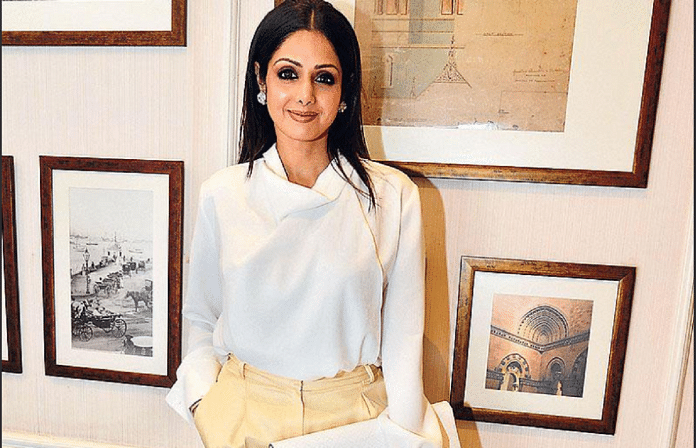Directors would brief Sridevi and wonder if she really understood them, because she would have a blank expression. But she was a master when facing the camera.
The first time I heard of Sridevi was in the early 1980s. Actor Jeetendra spoke to me about her while interviewing him. Then he took me to watch some songs of Himmatwala in which Sridevi was being launched.
And he told me: “Just watch her, she doesn’t speak a word in Hindi but she is going to be a sensation in Mumbai after this film.”
I interviewed Sridevi a lot of times all through the 1980s, but she was always a fortress you could not breach. She spoke very little and mostly answered in mono-syllables. The media was also not very kind to her. They called her ‘thunder thighs’ and ‘Ask mummy’ because most of her answers were either ‘Ask mummy’ or ‘yes’ and ‘no’.
But she was not bothered, because her endorsement came from her filmmakers. Even though she didn’t understand a word of the language, she was a master when facing the camera. Often people said that when the directors were briefing her, they wondered if she really understood them, because she would have a blank expression. But the minute the camera was turned on, she transformed into a livewire, some apsara in the way she danced and did her scenes.
I was on the sets with Shekhar Kapur when he was briefing her on the ‘I love you’ song in Mr India. Whatever Shekhar Kapur told her about what he wanted in the scene, she would just blankly listen to him and translate it in Tamil to her sister Srilatha, who stood next to her. After they went away, I asked Shekhar why she was explaining everything to her sister, especially because her sister is not going to do that scene. Shekhar said, “Maybe that is her way of processing.” When the camera turned on, again she was an absolute joy to watch.
In the 1980s, she was a contender with Jaya Prada, her rival at that time. Everybody thought that maybe Jaya Prada was going to be the ‘number one’ because she had a more Indian face. But the directors said it was Sridevi who would take that position because she had the body and talent. She had the spunk and the spark.
When she was making it really big in Hindi cinema, the Tamil industry and the Telugu film industry were really in mourning. They were upset that their best star was taken away by the Mumbai industry.
In the 1990s, she got tired of staying in hotels. She was always parked in Centaur Hotel because she was working in so many movies in Mumbai. She then bought a new house in Lokhandwala.
I remember going to her new house at the time to interview her. Since I lived close to her home, she called me in the night for the interview because she returned late from shooting. When I entered her house, it was brimming with Tamil music and when I enquired about it, she said it is by A.R. Rahman. She said, “He is just a 27-year old boy; you just wait and watch how he will be grabbed by the Hindi film industry.”
We met a number of times all through the 1990s. I saw how the marriage took place; I went to visit her when she had her first baby in the hospital. In fact, I suggested the name Jhanvi. Later, she also became mother to Khushi.
Then there was a phase when everybody would ask why Sridevi was not making a comeback. I bumped into her at a coffee shop and told her that it was time she came back and she just smiled. That was typical Sridevi, she never revealed what was going on in her heart and in her head. Within a week, I read in papers that she was coming back with the new film English Vinglish.
We had a long chat after the film was released and she was very happy with the feedback. Again when we chatted up after Mom, she seemed happy.
Her death is a big loss. I think that she was starting to open up and she was sharing more of herself. She was becoming less guarded and less careful about what she was expressing. She was on Twitter; she would ask for your IDs and tag you in tweets.
This was a time when she was just so excited about her daughter’s launch. She had gone for the wedding of her sister-in-law’s son, she was posting pictures. She was all over the media in the last four months. She was on the cover of fashion magazine and on the ramp. Maybe because God knew the end was near.
Bhawana Somaaya is a film historian and author in Mumbai.
(As told to Talha Ashraf, journalist at ThePrint)







sridevi death very Very Un HappyNess